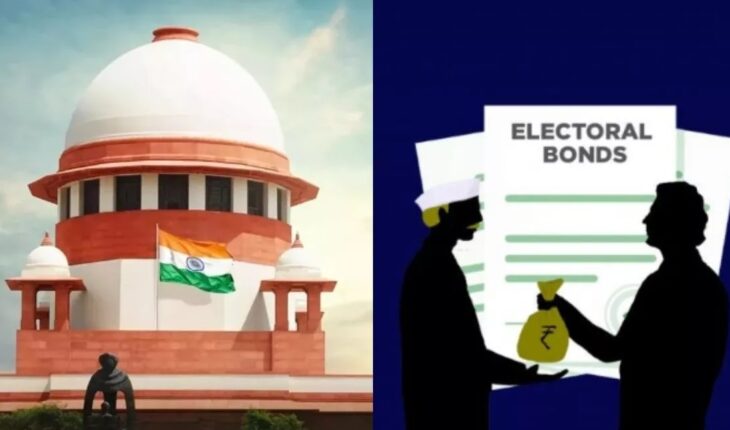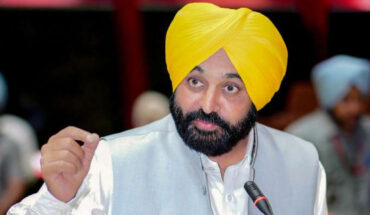New Delhi: CJI had commented that this scheme should not become a legalization of bribery and vendetta between the centers of power and the people well-wishers of that power.
What has the Supreme Court said in its decision ? – The State Bank should stop selling electoral bonds. This electoral bond scheme is closed now. State Bank will have to disclose its complete information for the year 2019 on its website. It is the voter’s right to know where the money in electoral bonds came from and who invested it. Not giving this information is also a violation of information rights.
What are the challenges in EBS ? – Electoral bonds are donations made to political parties that keep the identity of donors and recipients anonymous. They may compromise the right to know, which is part of the right to freedom of expression under Article 19 of the Constitution.
Anonymity can be compromised due to government access to donor data. This means that the government in power can take advantage of this information which can disrupt free and fair elections. The danger of crony capitalism and use of black money: Crony capitalism is an economic system that leads to close, mutually beneficial relationships between businessmen and government officials. There are many loopholes regarding transparency and donation limits for corporate entities. According to the Companies Act 2013, a company can make political contributions only if its average net profit for the last three financial years is 7.5%, but this section has been removed, thereby increasing the scope for black money contribution to political funding through shell companies, anxiety has increased.
Last year, several petitions were filed in the Supreme Court, challenging the validity of the Electoral Bond Scheme. A five-judge Constitution bench headed by Chief Justice DY Chandrachud heard the Centre’s stand and the four petitioners who challenged it. Now the court has given its decision on this. The Supreme Court has completely banned the electoral bond scheme, considering it unconstitutional. Also, State Bank has been asked to make its complete information public within three weeks. In this regard, an affidavit was submitted by the Center on 29 October 2023. Attorney General R Venkataramani told the apex court that citizens do not have a general right to know the sources of electoral bonds.
It is going to be around 5 years since the electoral bonds were issued. Even now people have very few information about it. The biggest question is that who are those people who are giving their money to electoral parties through electoral bonds. In fact, electoral bonds were issued as an alternative to cash donations to political parties in such a way that it would increase transparency in political funding.
Earlier, this could have kept secret the money that was coming to political parties through electoral bonds. But recently there was controversy on this. The matter reached the Supreme Court. After this, the Supreme Court gave its verdict. Now the Supreme Court has said that all political parties will have to give information about electoral bonds to the Election Commission. Along with this, the Political parties will also have to provide their bank details. The court has said that political parties should give all the information to the commission in a sealed envelope. But this matter did not stop only here, rather the validity of this entire electoral bond scheme was challenged.
What is electoral bond ?- Only political parties those are registered under Section 29A of the Representation of the People Act, 1951, which have secured at least 1% of the votes polled for the Lok Sabha or the Legislative Assembly in the last general election, can issue electoral bonds and are eligible to do so. The electoral bond system was introduced through a Finance Bill in the year 2017. It was implemented in the year 2018. They serve as a means for individuals and institutions to donate to registered political parties while maintaining the anonymity of the donor.
The only objection was that the information about who was depositing money through electoral bonds, how much money was being deposited and for which party, it was not being disclosed. When RTI was filed on this, it was said that this information cannot be made public to the citizens. Many political parties were also raising questions on its entire process. He was also emphasizing on increasing its transparency.
How are these Bond issued and is there any fixed time for this? – After its launch in the year 2018, it is issued almost twice every year. The 11th electoral bonds were issued in the beginning of October. While initially there was a few response towards its but this year it got a good buyer till before the elections.
How much money has been raised so far through electoral bonds ? -Rs 5851 crore has been issued so far through electoral bonds. Electoral bonds worth Rs 822 crore were sold in the month of May last year. From January to May 2019, bonds worth Rs 4794 were sold through various branches of State Bank of India. Whereas earlier in 2018, a bond worth Rs 1000 was sold.
Why was electoral bond created ? Electoral bond has been created by the Central Government to keep the details of donations of political parties in elections. It was said from the Center that this is for transparency of donations. Every penny given to every political party under electoral bonds will be accounted for by the bank.
Who can buy and at what price can they buy this Electoral Bond ? -Anyone can buy it, any citizen, company or organization of India can buy these bonds as donations for election. These bonds can be of one thousand, ten thousand, one lakh and up to one crore rupees. If any citizen of the country wants to donate to any political party, they will have to buy electoral bonds from SBI. They will be able to buy bonds and give them to any party.
Are there any benefits to the buyer of electoral bonds?- By purchasing electoral bonds and giving them to any party, the ‘bond buyer’ will not get any benefit. Nor is there any return on this money. This amount is like donations given to political parties. This provides exemption in income tax under Section 80 GG and Section 80 GGB.
From where people can buy these bonds ? These are available from selected branches of State Bank of India. The 29 branches from where bonds can be purchased are in many cities including New Delhi, Gandhinagar, Chandigarh, Bengaluru, Hyderabad, Bhubaneswar, Bhopal, Mumbai, Jaipur, Lucknow, Chennai, Calcutta and Guwahati.
Who issues bonds ? RBI issues these bonds on behalf of the government. The donor can buy bonds from the bank and give them to any party. Then the political party will be able to redeem the bonds in its account. The bond will not reveal who made the donation. When this bond is issued by the bank, the period for taking it is 15 days.
Does the buyer of this bond get his money back ? – Electoral bond is a kind of receipt. The name of the donor is not mentioned in it. By purchasing this bond, you write the name of the party to which you want to donate. The money from this bond goes to the concerned political party. There is no return on this bond. Although if any bond left with you means not given to any party, you can return this bond to the bank and get your money back but it has a fixed period.





